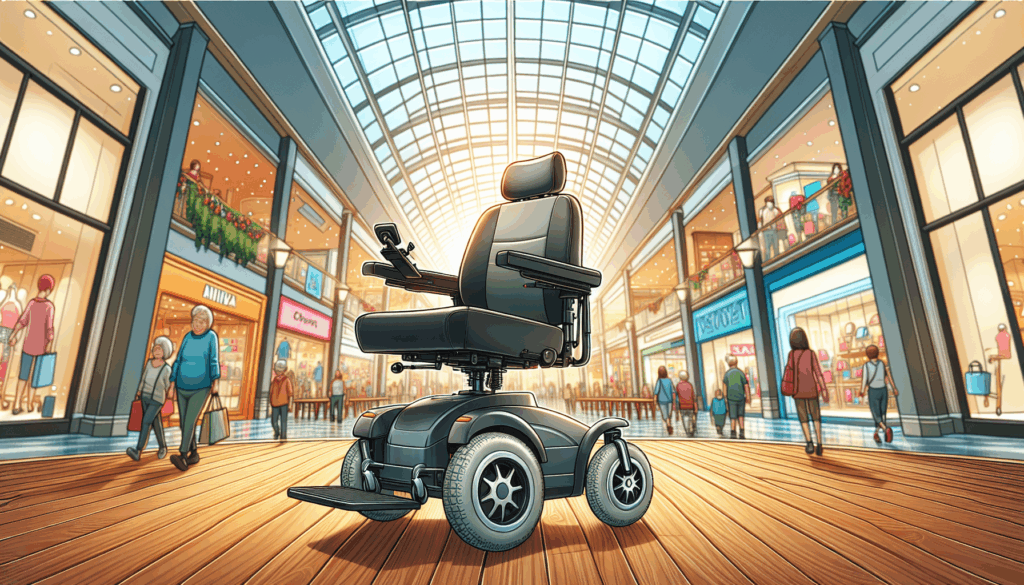
Electric wheelchairs have revolutionized mobility, providing users with the freedom to navigate their surroundings with ease and independence. With a variety of models available, each offering unique features, it can be overwhelming to choose the right one. In this blog, we will explore the differences between popular electric wheelchair models like the Edegree EW6, Edegree EW1, and Stonbike TU-04, while highlighting the life-changing benefits these devices bring to users. Understanding these differences and benefits could help you make an informed decision on the best electric wheelchair for your needs.
Types of Electric Wheelchairs: A Comparative Overview
Electric wheelchairs come in various types, each designed to cater to specific needs and preferences. For instance, the Edegree EW6 offers a range of 10-15km per charge and features a lightweight 14.8kg construction with a dual motor for smooth mobility. With a forward speed of up to 8km/h and a climbing ability of less than 10°, it is a versatile option for everyday use. On the other hand, the Edegree EW1, while slightly heavier at 38kg, provides a more extensive range of 20km with a dual motor and a better climbing ability of 13°. Its affordability at RM 2,499 makes it an appealing choice for those looking for a basic yet reliable electric wheelchair.
Furthermore, the Stonbike TU-04 stands out with its superior range of 25km and impressive climbing ability of 25°, accommodating a max load of 150kg. It combines a lithium battery for quicker charging (3-5 hrs) and affordability at RM 3,600, making it suitable for those requiring additional strength and distance. These varied electric wheelchair options allow users to choose based on their specific requirements, ensuring mobility and independence suited to their lifestyles.
Range and Battery Life: What You Need to Know
Electric wheelchairs have transformed the lives of individuals with limited mobility by offering greater independence, safety, and ease of movement. Unlike manual wheelchairs, which require significant physical effort, electric wheelchairs are powered by motors and controlled with joysticks or alternative systems, making them accessible to a wider range of users. There are several types of electric wheelchairs, each designed to meet different needs.
Rear-wheel drive models provide stability and higher speeds, making them ideal for outdoor use, while mid-wheel drive chairs offer superior maneuverability for indoor spaces. Front-wheel drive chairs handle uneven terrain better but may require more skill to operate. Users can also choose between lightweight travel models that are portable and easy to transport, and more robust full-size or heavy-duty models that offer greater comfort, power, and durability.
One of the most important considerations when choosing an electric wheelchair is battery life and travel range. These factors determine how far and how long a user can go without needing to recharge, which directly impacts their daily activities and independence. Most wheelchairs are powered by either sealed lead-acid (SLA) or lithium-ion batteries. SLA batteries are heavier and more affordable but generally offer shorter ranges and slower charging times.
In contrast, lithium-ion batteries are lighter, charge faster, and can provide longer ranges—making them a preferred choice for active users. On average, travel models can go 8 to 15 miles on a single charge, full-size chairs range from 15 to 20 miles, and heavy-duty models can sometimes exceed 30 miles depending on the terrain, user weight, and battery condition. Proper battery maintenance, such as regular charging and avoiding complete discharges, is key to maximizing lifespan and performance.
Overall, electric wheelchairs provide life-changing benefits by enhancing mobility, reducing physical strain, and enabling greater participation in everyday life. Understanding the different types available, along with key factors like range and battery life, helps ensure users choose a model that best fits their lifestyle and mobility needs.
Weight and Portability: Choosing the Right Option for Your Lifestyle
When selecting an electric wheelchair, weight and portability play crucial roles in ensuring that the chosen model aligns with your lifestyle. The Edegree EW6, weighing in at a manageable 14.8kg, offers an impressive range of 10-15km per charge, making it a great choice for those who need a lightweight option for daily outings. In contrast, the Edegree EW1 weighs significantly more at 38kg, but offers a more substantial range of 20km per charge. If portability is your primary concern, the Edegree EW6 is designed for easy transport, making it suitable for individuals who frequently travel or require a wheelchair that can be easily maneuvered in and out of vehicles.
On the other hand, the Stonbike TU-04, weighing 28kg, provides a balance between weight and performance with a commendable range of 25km, suitable for those who seek a robust option without excessively compromising portability. Another essential aspect to consider is the capability to support various user needs. While the Edegree EW6 and EW1 support a maximum load of 100kg, the Stonbike TU-04 can accommodate up to 150kg, catering to a broader demographic. Having the right weight capacity not only impacts portability but also enhances the overall comfort and accessibility. By understanding the weight and portability features of different electric wheelchairs, you can make an informed decision that best suits your personal mobility requirements and lifestyle needs.
Speed and Performance: Which Electric Wheelchair Suits Your Needs?
When it comes to choosing the right electric wheelchair, understanding speed and performance is vital in meeting your specific needs.
The Edegree EW6 offers a maximum forward speed of 8km/h, making it one of the fastest options available while maintaining a substantial range of 10-15km per charge. With a lithium battery and a dual motor system, this model excels in urban environments where speed and maneuverability are key. However, if your focus is on longer distances, the Stonbike TU-04 stands out with a range of 25km per charge at a similar forward speed of 6km/h. This balance between performance and range allows for a more extensive exploration without worrying about battery life, catering to individuals who may enjoy longer outings.
On the other hand, for those who prioritize affordability and still desire decent performance, the Edegree EW1 offers a lower price point at RM 2,499. It comes with a respectable range of 20km but maxes out at a speed of 6km/h. The climbing ability of 13° allows it to handle minor terrains effectively but may not excel in steeper inclines compared to the Stonbike TU-04, which handles a climbing ability of 25°. Choosing the right electric wheelchair ultimately revolves around understanding these nuances in speed and performance to find the right balance that caters to your lifestyle needs.

Climbing Ability: Navigating Different Terrains with Ease
When choosing an electric wheelchair, one of the critical factors to consider is its climbing ability, particularly if you need to navigate different terrains.
The Edegree EW1, for example, boasts a climbing capacity of 13 degrees, making it suitable for moderate inclines. In contrast, the Edegree EW6 is designed for less demanding environments with a climbing ability of less than 10 degrees, which may limit its effectiveness on steeper hills. Meanwhile, the Stonbike TU-04 outshines both with a remarkable climbing ability of 25 degrees, allowing users to tackle much steeper slopes and uneven surfaces, providing greater freedom and accessibility in various settings. This versatility is essential for outdoor enthusiasts or individuals living in hilly areas who require reliable mobility solutions.
Additionally, the different climbing capabilities of these electric wheelchairs directly correlate with the type of battery and motor they employ. The Stonbike TU-04, powered by a dual motor of 24v250w, generates enough torque to ascend challenging terrains effortlessly, whereas the relatively lower power options like the Edegree EW6 and EW1 may struggle in such situations. Thus, understanding the climbing ability can significantly influence your overall experience and independence, ultimately enabling you to navigate different terrains with ease and confidence in your electric wheelchair selection.
Cost Analysis: Evaluating Your Investment in Independence
When considering the purchase of an electric wheelchair, it’s essential to evaluate the various price points and what they offer in terms of features and benefits. For instance, the Edegree EW6, priced at RM 4,388, provides a range per charge of 10-15km, supported by a powerful dual motor and a comprehensive battery performance. While it might seem pricier, the quality of the lithium battery allows for better durability and overall efficiency, promising greater independence for the user. On the other hand, the Edegree EW1 offers a more budget-friendly option at RM 2,499, boasting a slightly longer range of 20km but employing a lead-acid battery, which does not match the longevity of its lithium counterpart.
Evaluating these options based on your lifestyle needs and daily requirements can greatly impact long-term satisfaction and mobility. Transitioning to another perspective, the Stonbike TU-04 stands as a strong mid-range alternative at RM 3,600. With an impressive climbing ability of 25°, this model is designed to enhance terrain mobility, making it ideal for varied settings. Understanding the cost is not just about upfront pricing but also revolves around the additional value brought through functionality, durability, and overall independence. An electric wheelchair is not merely a purchase; it’s an investment into a lifestyle that embraces freedom and accessibility, helping users maintain an active and fulfilling life despite physical challenges.
Health Benefits of Using Electric Wheelchairs
Electric wheelchairs provide significant health benefits that can greatly enhance the quality of life for users. One of the primary advantages is increased mobility, which can encourage physical activities and independence. For individuals who struggle with mobility due to disabilities or age-related issues, electric wheelchairs can allow them to navigate through their environment with ease, promoting a more active lifestyle. The ability to move freely not only contributes to physical health but also has positive effects on mental well-being, reducing feelings of isolation and depression.
Moreover, electric wheelchairs are designed with user comfort in mind, featuring ergonomic seats and customizable settings. This can help prevent common issues such as pressure sores that often arise from prolonged sitting or improper posture. For instance, models like the Edegree EW6 with a dual motor system not only ensure a smooth ride but also accommodate users with a maximum load of 100kg, providing safety and comfort. The market offers various options, each with unique specifications, such as the Stonbike TU-04, which boasts advanced climbing capabilities. Overall, the health benefits of electric wheelchairs extend beyond mobility, promoting longevity and a better quality of life for their users.
User Experience: Real Stories of Empowerment
Electric wheelchairs have transformed the lives of many individuals, providing newfound independence and mobility. Users often share stories of how these devices have allowed them to navigate their surroundings with confidence. For instance, a user of the Edegree EW6 recounts how the dual motor system empowers them to effortlessly traverse different terrains, including slight inclines, with a climbing ability of less than 10 degrees. Being able to cover distances of 10-15 km on a single charge has opened doors for them, allowing them to visit friends and participate in activities that were once challenging before switching to an electric wheelchair.
Another compelling story comes from a user of the Stonbike TU-04, who emphasizes the importance of battery efficiency and weight capacity. With a max load of 150kg and a range per charge of 25 km, they can travel longer distances without worrying about the wheelchair’s limitations. This user explains that the ease of charging in just 3-5 hours has provided added convenience to their daily routine. These real-life experiences highlight not only the practicality of electric wheelchairs but also their significant impact on the emotional well-being and overall empowerment of users, demonstrating how these devices bridge the gap between limitations and possibilities.

Embracing the Future: Choosing the Right Electric Wheelchair for Your Needs
In conclusion, selecting the right electric wheelchair can significantly impact your mobility and overall quality of life. With options like the Edegree EW6, Edegree EW1, and Stonbike TU-04, each model offers unique features tailored to accommodate various user needs. From battery types and charging times to maximum loads and climbing abilities, understanding these differences empowers individuals to make informed choices. As you weigh the options, consider not only the specifications but also the comfort and usability that each wheelchair provides in your daily activities and adventurous outings.
Moreover, the benefits of using an electric wheelchair extend far beyond mobility; they enhance independence, promote social interaction, and encourage exploration. With the ability to travel longer distances and tackle varying terrains, these wheelchairs are designed to fit seamlessly into modern lifestyles. Don’t hesitate to seize the opportunity to enhance your mobility and regain your independence with the perfect electric wheelchair that meets your lifestyle needs.

I have been struggling with mobility issues for years and I never knew about the different types of electric wheelchairs out there. This is a really informative blog post that opened my eyes to the possibilities.
Dear Elara Chua, we’re sorry to hear about your struggles with mobility issues, but it’s wonderful that you’ve found this blog post informative and helpful. Our team at Eko Life Malaysia is dedicated to empowering people with the knowledge they need to make informed decisions about mobility products. If you have any further questions or would like to discuss your specific needs, please don’t hesitate to contact us at [email protected] or +60 3-7890 3042. We’re here to help. Thank you for sharing your experience, and we hope you find an electric wheelchair that suits your needs.
I’m so glad this blog highlighted the various benefits of electric wheelchairs, especially how it enhances independence and promotes social interaction. It’s truly life-changing!
Sadly, it seems like there’s no summary provided for the blog. Please add one so readers like me can know what to expect.
I have seen my mom using electric wheelchair for years, but reading this blog made me realize the range and battery life is something we should probably consider upgrading. Thanks for sharing this valuable information!
Hello Sang Kaur, I’m glad our blog could help you identify the importance of upgrading your mom’s electric wheelchair’s range and battery life. At Eko Life Malaysia, we understand the significance of these factors for a comfortable and efficient riding experience. We offer professional servicing and advice for electric wheelchairs, including battery replacements and upgrades. If you’re interested, please feel free to contact us at [email protected] or +60 3-7890 3042 for more information. We’re here to help.
Wonderful blog post that shares many useful insights into choosing the right electric wheelchair! The personal stories are indeed inspiring and show how far technology has come. I’ll definitely recommend this post to anyone looking for wheelchairs or mobility aids.
Thank you so much for your kind words, Leena! We’re glad to hear that our blog post has been informative and inspiring. It’s our goal to provide valuable insights and real-life stories that help individuals make informed decisions about their mobility needs. If you or someone you know is looking for more information on our electric wheelchair offerings or require professional assistance, please don’t hesitate to reach out to us at [email protected] or +60 3-7890 3042. We’re here to help!